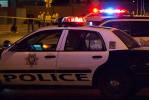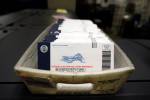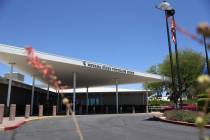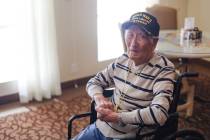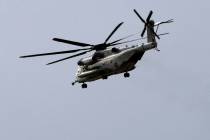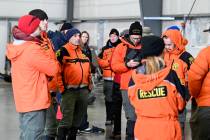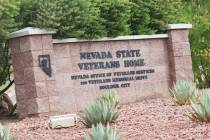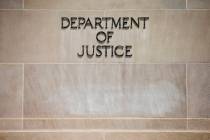Guidelines on drone usage get support


Civil rights groups and law enforcement agencies often clash when privacy rights are pitted against police searches.
But Dane Claussen, executive director of the American Civil Liberties Union of Nevada, generally agrees with guidelines from the International Association of Chiefs of Police for using drones, or Unmanned Aerial Vehicles, equipped with high-tech spy cameras.
“I’m not necessarily pleasantly surprised but relieved that the police chiefs association recommended a whole bunch of measures that would preserve Americans’ constitutional rights,” Claussen said last week from his Reno office.
The Fourth Amendment guards against unreasonable searches and seizures.
Last month, the Association for Unmanned Vehicle Systems International, which sponsored a recent drone conference in Las Vegas, announced that two FBI associations had endorsed drone-use guidelines adopted by the aviation committee of the police chiefs association.
Basically, those guidelines said police who use UAVs for gathering evidence of criminal wrongdoing need a search warrant before drone flights intrude on someone’s “reasonable expectations of privacy.”
The guidelines also include provisions for not keeping images taken by UAVs unless they’re required as evidence in an ongoing investigation or for law enforcement training.
In addition, retained images should be open for public inspection, and there should be regular audits of flight documents.
Claussen said he concurs with those recommended guidelines, especially the part about obtaining a search warrant instead of a court order for certain UAV operations. He said law enforcement agencies usually prefer having more leeway than is provided by a warrant.
“We’re very pleased to see the police chiefs recommending drones be used only upon issuance of a search warrant,” he said, noting that the same should apply to tracking people through cellphones and GPS devices.
Claussen suggested improvements to the guidelines, including a requirement that police agencies seeking Federal Aviation Administration approval for flying UAVs obtain public input for their plans.
“Obviously the more transparent police are, the better,” without compromising their tactics for apprehending legitimate suspects, he said.
The guidelines also would be improved by requiring agencies to post policies for using drones on their websites.
“Another one they should be tracking (is) discriminatory use of drones by keeping records of when, where and why,” he said. Such records would quickly show whether “90 percent of the time they’re used in African-American neighborhoods, when African-Americans are only 10 percent of the population.”
Claussen noted the difference between UAVs and manned helicopters, or even patrol cars, conducting surveillance operations.
“The difference is you will hear a helicopter, but you won’t necessarily hear a drone,” he said.
“And let’s say a police car is parked across the street from your house. You have some reasonable opportunity to see what’s going on. But having someone parked across the street, staking out your house, is different than a drone hovering over your backyard.”
Ordinarily, he said, homeowners can have their privacy reasonably protected by tall block walls, curtains and blinds.
“It’s not rocket science,” Claussen said. “If you’ve got a big, picture window that faces the street, then you don’t have reasonable expectations of privacy if you’re standing naked in the window.”
The ACLU also recommended that drones for domestic use should not be equipped with weapons.
The advent of armed drones raises public safety concerns.
Armed UAVs operated by the Air Force and CIA, such as the MQ-1 Predator and MQ-9 Reaper, can fire laser-guided Hellfire missiles. The Reaper can also launch precision-guided bombs.
One helicopter drone, the ShadowHawk, purchased by the Montgomery County sheriff’s department in Texas from Vanguard Defense Industries through a $300,000 Homeland Security grant, can be armed with a shotgun and grenade launcher.
However, the FAA said in a statement Friday it has not authorized law enforcement agencies to conduct armed operations with UAVs. The FAA regulates UAV operations to ensure “they do not pose a hazard to manned aircraft or people, or property on the ground.”
Under current rules, private entities can operate drones only for research and development purposes.
Anyone illegally operating an armed drone would draw the attention of the Bureau of Alcohol, Tobacco, Firearms and Explosives, said Helen Dunkel, a special agent and spokeswoman for the bureau’s San Francisco Field Division.
“To use a firearm unsafely in public is a concern, and definitely would be looked at,” Dunkel said.
Contact reporter Keith Rogers at
krogers@reviewjournal.com or 702-383-0308.
■ Drones should be prohibited for mass surveillance or spying on activities protected by the First Amendment. Unmanned Aerial Vehicles should only be used for collecting evidence allowed under a search warrant and for emergencies such as a fire, hostage crisis or search-and-rescue operation.
■ Images captured by UAVs should not be retained or shared unless there is reasonable suspicion they contain evidence of criminal activity, or pertain to an ongoing investigation or pending criminal trial.
■ Policies for using UAVs should be explicit and written, and available to the public.
■ UAV deployments and policy decisions should be democratically decided based on public information, “not made on the fly by police departments simply by virtue of federal grants or other autonomous purchasing decisions or department policy fiats.”
■ Independent audits should be used to track UAV deployments so that citizens and watchdog groups can assess how and how often drones are used, and, if they are being used, whether it is a worthwhile public expense.
■ Drones for domestic use should not be equipped with lethal or nonlethal weapons.
INTERNATIONAL ASSOCIATION OF CHIEFS OF POLICE






